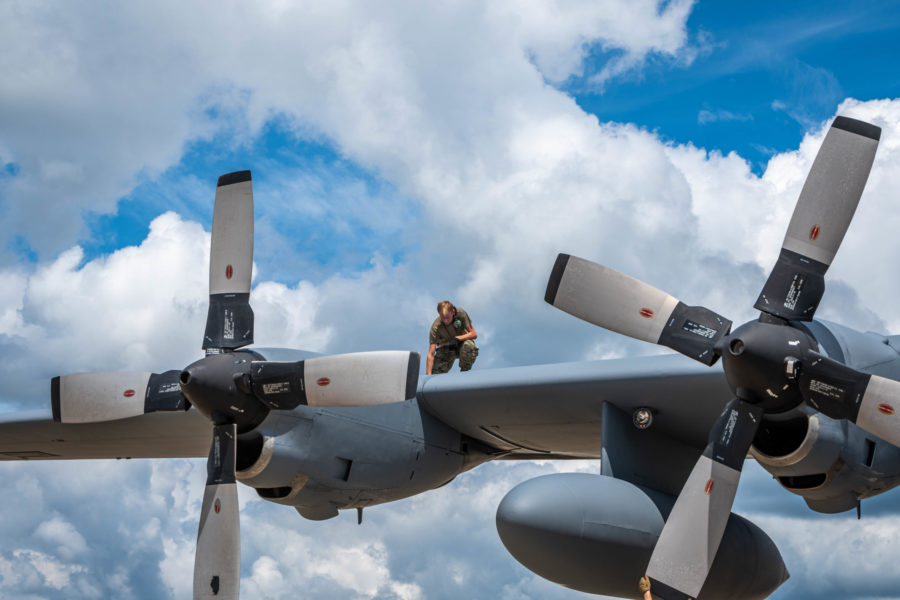Air Mobility Command and Air Combat Command confirmed that they have grounded their C-130H variants with older propeller systems after discovering cracked parts—and AMC is considering accelerating the production and installation of new propellers to replace them.
All told, up to 116 C-130Hs could be affected as AMC waits for field-level inspections of the aircraft to assess the scope of the problem, spokesperson Maj. Beau Downey told Air & Space Forces Magazine.
A “post-depot operation engine run check” at Warner Robins Air Logistics Center, Ga., first revealed the issue when a maintenance crew discovered a leak from one of the propellers, Downey said.
A further inspection found a crack in the propeller barrel assembly, and the same issue was subsequently discovered in two more propeller assemblies.
No safety incidents or issues have been reported as a result of the cracked propeller barrels, Downey said, but Air Mobility Command issued a safety time compliance technical order (TCTO) for all C-130Hs with 54H60 propellers.
After more analysis, AMC issued an immediate action TCTO on Sept. 27 “directing replacement of a variety of specific suspect propellers,” Downey said.
A timeline for when the aircraft could be back in the air hasn’t been established yet, with Downey saying AMC is working on a “multi-faceted recovery plan to resume safe aircraft operations as soon as possible.” That recovery plan will be an “incremental process,” he added.
In the meantime, “the Air Force has been able to mitigate operational impacts with other aircraft,” Downey said.
The TCTO does not cover C-130Hs that have already been upgraded to new NP2000 propellers, or any C-130Js.
The Air Force has been in the process of replacing the propellers on its C-130H variants for years now, seeking to swap out older propellers built before 1971. In 2019, USAF officials noted in a congressional hearing that some of those propellers were prone to cracking. Collins Aerospace, which produces the eight-bladed NP2000, noted in a 2021 release that the Air Force has ordered upgrades for 83 C-130Hs.
“Accelerating NP2000 production and installation is one of multiple avenues we are pursuing to resume operations as soon as possible,” Downey said.
The Air Force’s C-130H cargo aircraft are entirely in its Guard and Reserve fleets, according to the most recent inventory numbers. Some variants, however, are in the Active-duty component, including the MC-130H Combat Talon II and the EC-130H Compass Call.
A post last week on the popular unofficial Air Force amn/nco/snco Facebook page reportedly showed that several MC-130Hs and EC-130Hs were also affected by the propeller issue.
“Air Mobility Command, as the lead command, is working closely with affected units and technical experts across the mobility air forces to complete this action, while prioritizing available assets based on requirements,” Downey said in response to a query from Air & Space Forces Magazine as to whether AMC is working with other major commands that operate C-130H variants.
Air Combat Command spokesperson Capt. Lauren Gao said the command grounded its fleet of seven EC-130Hs and one trainer TC-130H and has completed inspections. ACC is currently complying with the TCTO and working with Air Mobility Command and Air Force Materiel Command’s C-130 System Program Office to “prioritize serviceable propellers based on requirements as quickly as possible while ensuring the safety of our aircrews,” Gao said.
Air Force Special Operations Command, which operates the MC-130H, did not immediately respond to a query.
